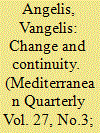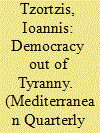| Srl | Item |
| 1 |
ID:
148647


|
|
|
|
|
| Summary/Abstract |
A comparison between the two dictatorships of Greece in the twentieth century (the 4th of August regime of 1936 – 41 and the Colonels’ dictatorship of 1967 – 74) cannot be fruitful if it is static. One cannot understand the nature of these two regimes without studying the years that separated them. This period oscillated between Venizelism and anti-Venizelism and was characterized by the ideological struggle between capitalism and communism of the Cold War prior to the restoration of democracy in Greece in 1974. A look at these years reveals interesting insights into the legacies and the continuities of Greek society in the twentieth century.
|
|
|
|
|
|
|
|
|
|
|
|
|
|
|
|
| 2 |
ID:
148650


|
|
|
|
|
| Summary/Abstract |
This essay draws on archival documents to explore the British Empire’s plans for establishing a university in the eastern Mediterranean in the 1930s. The British possessions in the region were at stake in the aftermath of the First World War. Since the early 1930s the Foreign Office had been eagerly planning the establishment of a university in the region in order to make the local elites familiar with Western culture. Egypt, Palestine, and Cyprus were considered the most likely locations for the institution. It is argued that cultural propaganda was perceived by the Foreign Office as an essential component of the empire’s strategy and legitimacy in its sphere of influence. Although the project was eventually not realized due to the outbreak of the Second World War, its significance lies in the demonstration of the British grand strategy in the eastern Mediterranean during the interwar period.
|
|
|
|
|
|
|
|
|
|
|
|
|
|
|
|
| 3 |
ID:
148648


|
|
|
|
|
| Summary/Abstract |
This essay presents the findings of comparative research on democratic transitions by reforma in Greece, Spain, and Turkey but in a framework not previously used and one rather different from the one established in the now-classical study of democratic transitions set by Guillermo O’Donnell and Laurence Whitehead in the 1980s. The departing point of this comparative approach is a case unknown to many: the ill-fated 1973 Greek attempt at self-transformation, known as “the Markezinis experiment” after Spyros Markezinis, who assumed the task of bringing the country to democracy in the way Adolfo Suárez González would do in Spain four years later. The attempt stalled before it was ended by a coup organized by the regime hard-liners tacitly backed by the military as an institution. The cases compared include Spain and Turkey, which underwent similar transitions, but with very different outcomes: consolidated democracy and “difficult democracy,” respectively. The reasons are sought in the different regime natures and elite and counterelite choices.
|
|
|
|
|
|
|
|
|
|
|
|
|
|
|
|
| 4 |
ID:
148651


|
|
|
|
|
| Summary/Abstract |
Negotiations for the settlement of the Cyprus question have resumed amid a pressing geopolitical and economic reality. Greek and Turkish Cypriots adopt distinct interpretations of the United Nations – designated recipe for a bicommunal and bizonal federation in Cyprus. In the relative absence of major normative preconditions for settlement, including a lack of common vision and mutual trust, the pillar notions of federalism and consociationalism have been adapted to serve each side’s vital security concerns and to increase each side’s leverage in a future federal arrangement in Cyprus. This study conducted an opinion poll of young, educated Greek Cypriots to identify the preferred type of constitutional settlement in the context of a number of perceived motives, constraints, and preconditions. The findings of this survey reveal substantial consensus on the acceptance of a bizonal, bicommunal solution. Yet acceptance of a federal solution is subject to certain prerequisites. The study reveals the varying influence of current economic concerns on a prospective solution.
|
|
|
|
|
|
|
|
|
|
|
|
|
|
|
|
| 5 |
ID:
148646


|
|
|
|
|
| Summary/Abstract |
This essay traces the transfer of private ownership of economic resources from sovereign rulers to the modern nation-state, starting with mercantilism and ending with exclusive economic zones. Nation-states were initially envisaged as bodies that acted on behalf of their citizens, but over time they have become distant from democratic processes as they have sought to claim property rights over more and more of the planet, and now of outer space. Consequently, what remains of the global commons is on the verge of extinction. This essay examines whose interests such activities serve and the resulting implications.
|
|
|
|
|
|
|
|
|
|
|
|
|
|
|
|
| 6 |
ID:
148649


|
|
|
|
|
| Summary/Abstract |
Successive US administrations, including that of George W. Bush, have not recognized Palestinian interests and demands. The Bush administration initially showed a lack of serious intent to intervene in the Palestinian-Israeli conflict and had a negative position toward the Palestinians and their interests. However, subsequent Bush administration mediation of the Palestinian-Israeli conflict gained the Palestinians’ acceptance. This essay investigates the motivations and reasons behind the Palestinian officials’ endorsement of the mediation. The researchers conducted 6 face-to- face interviews and 112 structured interviews with senior Palestinians, including negotiators, security officials, political leaders, parliamentarians, academicians, and experts in the field.
|
|
|
|
|
|
|
|
|
|
|
|
|
|
|
|